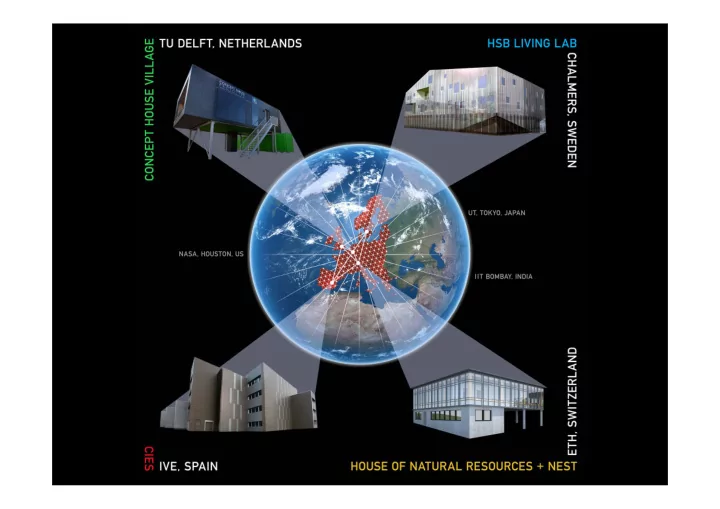

Building Technologies Accelerator BTA a pathway towards exploitation of the full potential of GHG reductions in the built environment Holger Wallbaum The BTA network has far-reaching ambitions to accelerate the commercialisation potential for low carbon products and services in the built environment
BTA partners Letters of intent HSB Riksbyggen Poplar Harca Siemens building technologies Picatec Hubber Duravit BASF The Livinglab network will be an outstanding platform for open innovation Based on its attractive knowledge innovation network and through its open innovation model, BTA provides opportunities for rapidly expanding the network in the coming years.
Building technology impact Current state of play The Challenge: Implementation of new and sustainable building technologies 40% of global anthropogenic greenhouse into the market is slow gases and 50% of landscape change are the result of building activities New technologies not generically scalable as they are not adapted to Approximately 10% of global gross specific climate conditions or user domestic product and about 8% of all specifics global jobs are connected to building activities Market is risk averse, leading to conservative optimisation instead of true innovation Low energy price vs. high investment to develop and test new technologies (problem especially for startups) Refurbishment of existing building New technologies not known or seen as stock is a key too risky by down-stream stakeholders challenge The dissemination of new and sustainable building technologies into the market remains slow while the potential to reduce the climate impact of new and old buildings remains high
Our innovation approach First, we allow for innovation instead of conservative optimisation. Second, we facilitate the Livinglabs platform for business and society.
Our network The BTA Livinglabs network provides an unprecented European scale with global commercial impact
BTA builds on LivingLabs, Test Beds, Markets and Urban Society The BTA approach is holistic and inclusive, combining market knowledge, insight studies in existing residential and commercial buildings, with the Livinglabs network
User Participation in the Livinglabs Building Technology and Human Activity in Context Open innovation defines prototyping projects together with end-users and relevant stakeholders Co-creation pilots allow us to understand how sustainable consumption could be changed and what is viable in the market When actual energy usage by consumers is not in line with the estimated demand then business cases (such as energy contracting) are at stake Delft concept: Humans living in buildings do not necessarily behave as one would like or expect Human behaviour has a clear effect on the performance of buildings and building technologies and therefore on related business cases
CO 2 reduction activities Prototyping and open innovation calls Masters and Phd level projects with industry Support and input to theJourney and thematic summer school Development of common methodologies and frameworks Interdisciplinary conference and ideas creation workshops Technology pool database Social media communication The University of Tokyo wish to contribute with their zero BTA dissemination event energy Livinglab – Japanese market The BTA will reduce the CO 2 eq emission by 0.5 million ton within the flagship period. The CO 2 eq reduction will continue after 2018 along with the dissemination of the flagship outcomes.
Kick start – 2014 activities Prototyping calls – to raise commercial value through interested and active businesses Three thematic focus areas – chosen to build the commercial value of the Livinglabs network – Home energy management system – Innovative facade systems – Innovative work environment The new CHIBB Concept House, TU Delft The first year of BTA 2014 contains activities that measure the proof of concept and provide evidence for the Climate-kic Board that BTA will gain commercial success
Management and business plan – 2014 Development of the BTA business plan with a four month deliverable Establish management and governance A stage gate approach 2014 detailed report outlining success and difficulties and providing the basis for taking the flagship to a its full potential Larry Toups, NASA, will work with us on innovations for space habitation which can be used on Earth, eg Velcro and aerogel The first year of BTA will establish governance and process and make important first strides towards KPI achievement
Business and market outcomes 2014 1. Home energy management system 3. Smart office concept Design and operation guidelines Sensor and visualisation system for low carbon office buildings E-quarium Increased employee well-being Value creation in housing and comfort, less days of absence associations, Sweden and Netherlands Lower life-cycle costs 2. Innovative facade system David Keyson’s user-centred innovation provides economic Innovative and demonstrated incentive through savings combinations of high performance and adaptive materials (industrial process driven) 2nd skin concept for refurbishment Thermal gain facade system for refurbishment Commercialisation potential in US, India and Japan – Larry Toups (NASA), professor B.K. Chakravarthy IIT-Bombay and professor Ryozo Ooka, University of Tokyo
Business and market outcomes BTA 1. Technology Pool: creation of a database of tested/proven technologies. Subscription to database, analytic reporting and consultancy. 2. Provision of training for architects, engineers, consultants and contractors: Market knowledge on cutting edge technologies and their implementation. 3. Measurement and cost/benefit analysis – modelling and carbon accounting. Comparison of new technologies versus ‘Business as Usual‘ solutions – Advisory services and Off-setting. 4. Providing a quicker and verifiable route to commercialisation. 5. Accreditation/Kitemark – BTA/Climate KIC accredited/tested/kitemarked product, a key market differentiator. Proving the business case quicker and with thorough verification. 6. Retrofit advisory services to property owners, managers and occupiers. 7. Market knowledge – consultancy to technology development companies Knight Frank will provide trusted leadership in enabling the full commercialisation potential of the Livinglab network
Food for thought: The Netherlands building corporations recently committed to a 6.5 billion Euro investment in making homes energy neutral
Recommend
More recommend